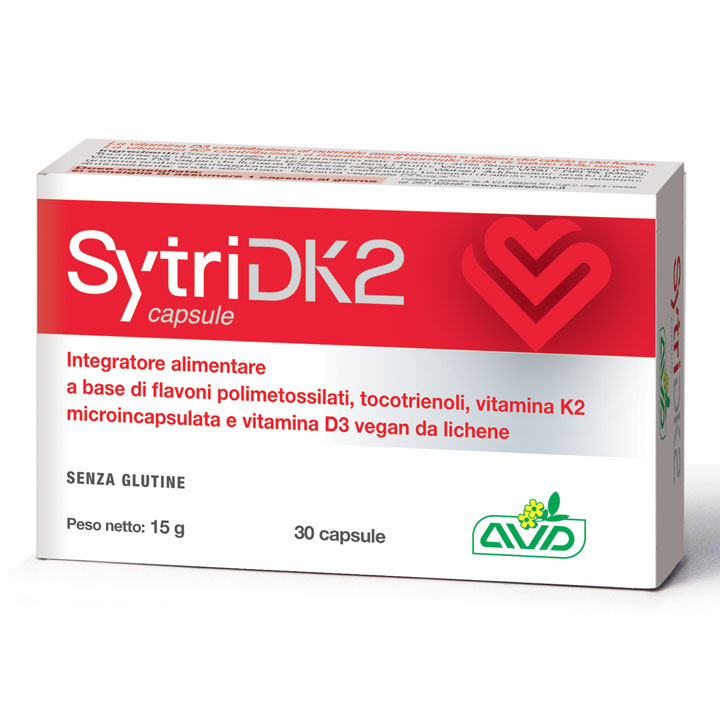
Improves overall cardiovascular health
Based on polymethoxylated flavones, tocotrienols, microencapsulated vitamin K2 and vegan vitamin D3 from Lichen.
HEALTH BENEFITS:
SytriDK2 acts on both the osteoarticular system and the cardiovascular system. Vitamin D3 is responsible for absorbing the calcium which, when there is a K2 and magnesium deficiency, tends to build up and cause the coronary calcifications that are a prelude to atherosclerosis.
Vitamin K2 promotes the fixation of calcium in the bones and teeth, reducing the risk of fractures and improving the density and level of bone mineralization in conditions such as osteopenia or osteoporosis, which occur more frequently with aging in conjunction with hormonal changes such as the menopause and with changes in metabolism (metabolic syndrome, type 2 diabetes).
PROPERTIES:
SytriDK2 provides the unique synergy of vitamin D3 (cholecalciferol), the active form of vitamin D, and vitamin K2 (menaquinone-7), with tocotrienols and flavonoids from citrus nobilis exerting, respectively, antioxidant, anti-inflammatory and regulating effects on plasma lipid levels. The synergy between vitamin D3 and K2 has been amply demonstrated: vitamin D3 promotes the correct absorption of calcium and the production of proteins that require vitamin K2 to function properly.
INGREDIENTS:
- Citrus nobilis dry extract titrated at 40% in polymethoxylated flavones (PMFs)
- Palm tocotrienols
- Vitamin K2 VITAL® DELTA (Menaquinone-7)
- Vegan vitamin D3 (cholecalciferol) from lichen
- Anti-caking agents: maize starch, arabic gum, calcium carbonate, silicon dioxide, magnesium stearate
PROPERTIES OF THE INGREDIENTS:
- Polymethoxylated flavones and Tocotrienols: contributes to reduce total cholesterol, LDL, triglycerides levels in the blood and the LDL:HDL ratio.
- Microencapsulated Vitamin K2 VITAL® has a half-life of about 72 hours and a high degree of purity and bioavailability. The action of vitamin K2 is twofold: it prevents the calcium that circulates in the blood, and that we take in with food, from building up in the arteries and soft tissues, and promotes the action of the matrix Gla protein and of osteocalcin, essential for bone mineralization and whose deficiency leads to osteoporosis. This helps bone calcification and diminishes the risk of plaque formation in the arteries and of tissue calcifications.
- Vegan vitamin D3 from Icelandic lichen (2000 IU): essential for the metabolism of calcium and phosphorus, bone mineralization and the absorption of vitamin A; its deficiency causes rickets, osteomalacia and osteoporosis. Vitamin D3 promotes muscle contraction and trophism, fights diabetes and metabolic syndrome, stimulates the immune system by reducing the incidence of infections and some autoimmune diseases and plays a crucial role in cardiovascular protection
HOW TO USE:
1 capsule a day with the main meal
PACK:
blister with 30 capsules
DRcapsTM acid-resistant vegetable capsules
NOTES:
Gluten Free
| AVERAGE CONTENT OF CHARACTERISING INGREDIENTS | PER DAILY DOSE (1 CAPSULE) |
| Citrus nobilis dry extract titrated at 40% | 286 mg |
| PMFs content | 114,5 mg |
| Tocotrienols | 12 mg |
| Vitamin K2 (Menaquinone-7) | 100 mcg |
| Vitamin D3 (Cholecalciferol) | 50 mcg (2.000 U.I.) |
Bibliografia:
- Borradaile NM, Carrol KK; Kurowska EM. Regulation of HepG2 cell apolipoprotein B metabolism by the citrus flavanones hesperitin and naringenin. Lipids. 1999;34(6):591-598
- Kurowska EM, Manthey JA, Hasegawa S, Manners GD, Vanderberg TA. Cholesterol-lowering effects of citrus juices, flavonoids and limonoids. Paper presented at: International Conference and Exhibition on Nutraceuticals and Functional foods; September 13-17,2000; Houston, TX.
- Kullo IJ, Gau GT, Tajik Aj. Novel risk factors for atherosclerosis. Mayo CLin Proc. 2000; 75(4): 369-380.
- Parker RA, Pearce BC, Clark RW, Gordon DA, Wright JJ. Tocotrienols regulate cholesterol production in mammalian cells by post-transcriptional suppression or 3-hydroxy-3-methylglutaryl-coenzyme A reductase. J. Biol Chem. 1993; 268(15): 11230-11238.
- Guthrie N, Kurowska EM. Anticancer and cholesterol-lowering activities of tocotrienols. In: Widman REC, ed. Handbook of Nutraceuticals and Functional Food. Boca Raton, FL: CRC Press; 2000:269-280.
- Quereshi AA, Bradlow BA, Brace L rt al.Response of hypercholesterolemic subjects to administration of tocotrienols. Lipids 1995; 30(12):1171-1177.
- Schurgers LJ, Vermeer C.- Determination of phylloquinone and menaquinones in food. Effect of food matrix on circulating vitamin K concentrations. Haemostasis 2000;30:298-307.
- Abedin M, Tintut Y, Demer LL. ascular calcification: mechanisms and clinical ramifications. Arterioscler Thromb Vasc Biol 2004; 24: 1161-70
- Saito E, Wachi H, Sato F, Sugitani H, Seyama Y. Treatment with vitamin K2 combined with bisphosphonates synergistically inhibits calcification in cultured smooth muscle cells. J Atheroscler Thromb 2007; 14:317-24
- Joline W.J. Beulens, Michiel L. Bots, Femke Atsma, Marie-Louise E.L. Bartelink et al.– “High dietary menaquinone intake is associated with reduced coronary calcification” – Apr. 2008
- Geleijnse JM, Vermeer C, Grobbee DE, Schurgers LJ, Knapen MH, van der Meer IM, Hofman A, Witteman JC. Dietary intake of menaquinone is associated with a reduced risk of coronary heart disease: the Rotterdam Study. J Nutr. 2004;134(11):3100-5.
- Beulens et al: High dietary menaquinone intake is associated with reduced coronary calcification. Atherosclerosis. 2008 Jul 19. 25. Beulens JW, Bots ML, Atsma F, Bartelink ML, Prokop M, Geleijnse JM, Witteman JC



